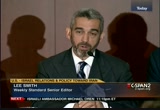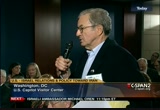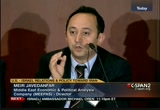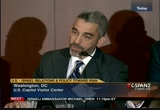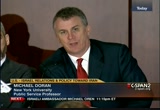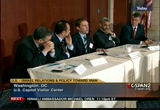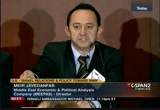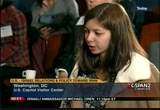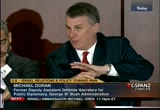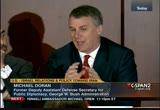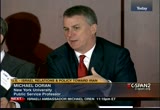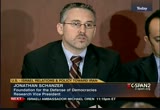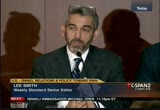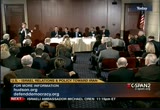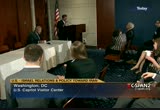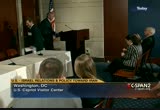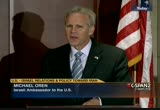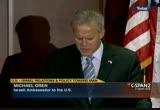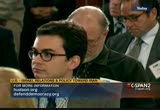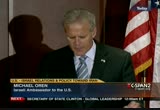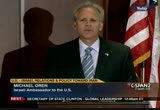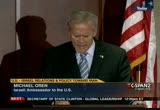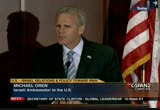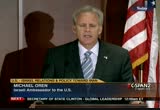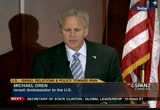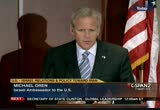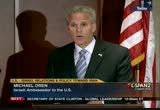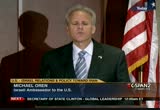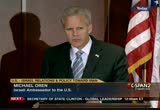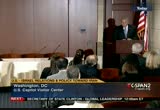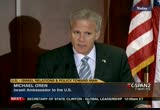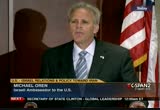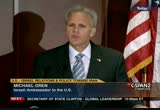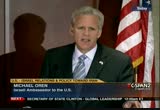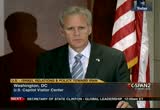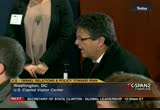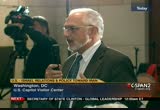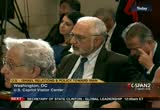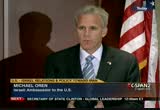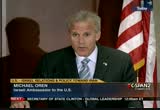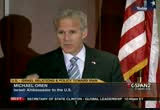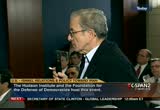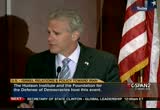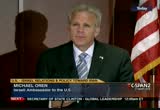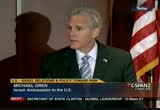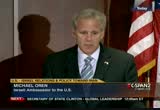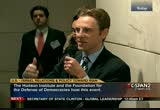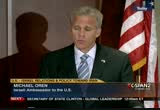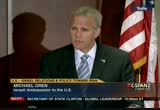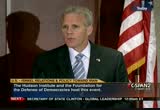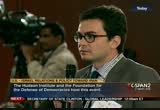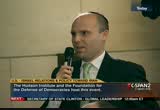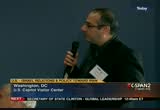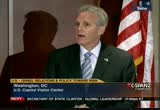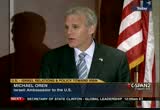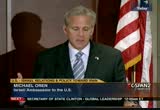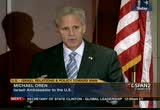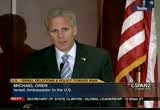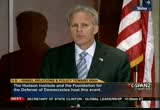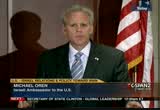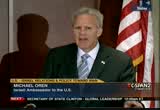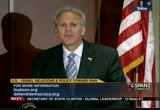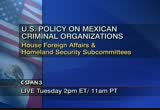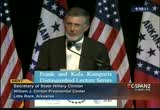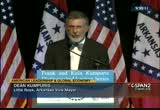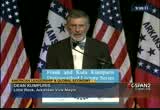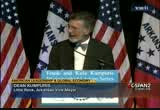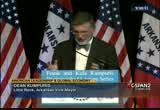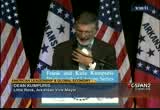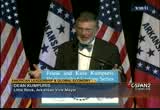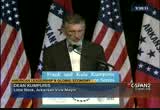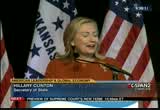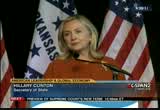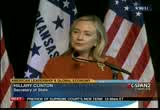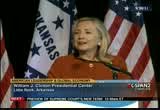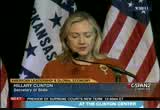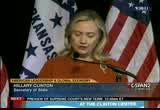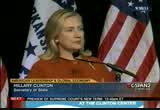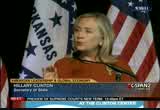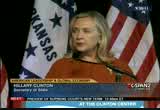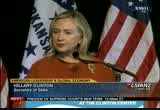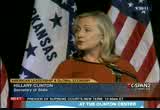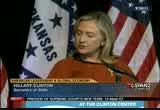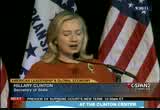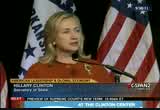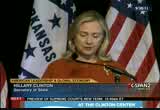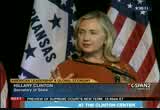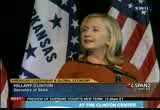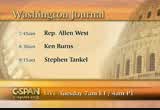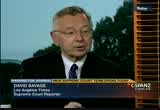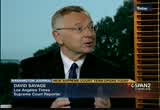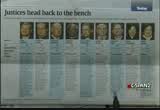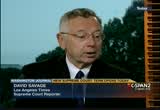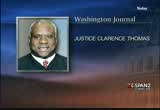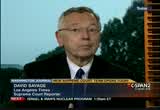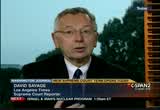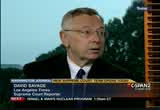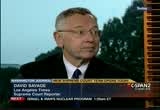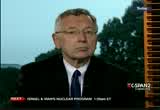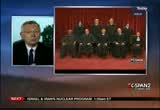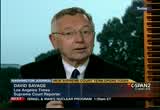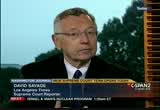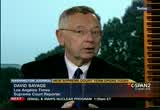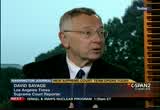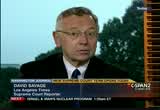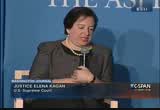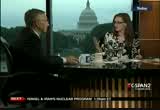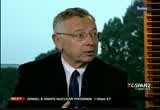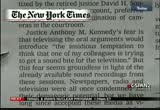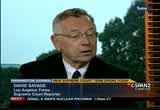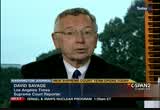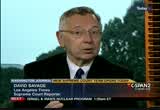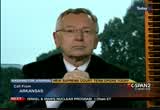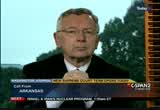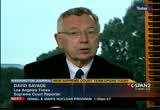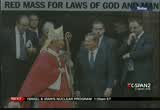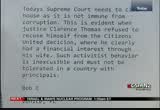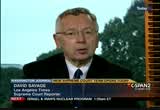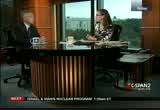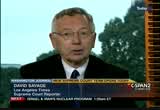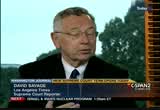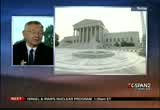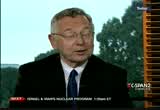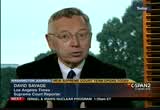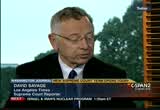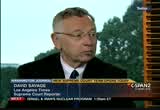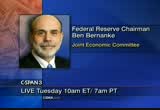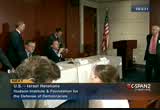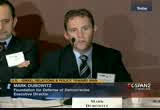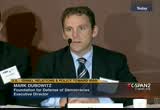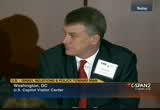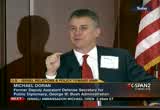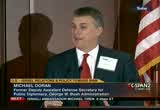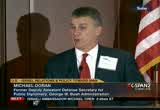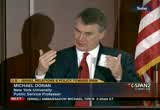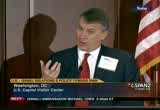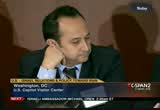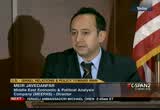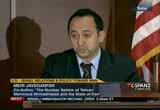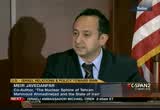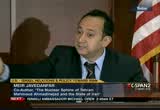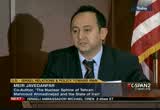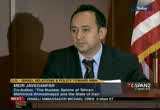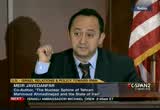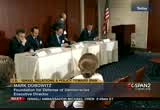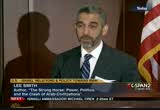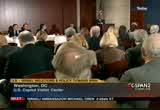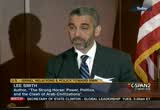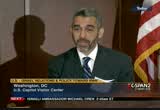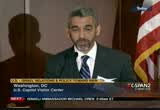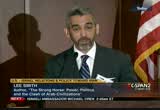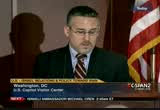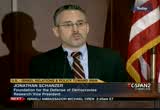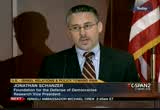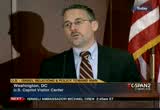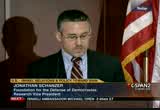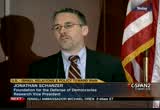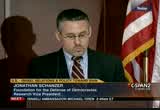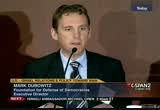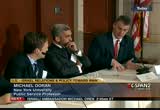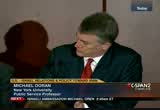tv Capital News Today CSPAN October 3, 2011 11:00pm-2:00am EDT
11:00 pm
the source of problems that it causes abroad whether it is through hezbollah and if you look right now there are a number of different reasons hezbollah is constrained. partly it is because of the supply line. it feels everyone and his -- you talk about the isolation at this point but if you look at hezbollah leader isolated with the iranians and the regime and the syrian regime having basically been frozen and then if you look at the other pro communities inside of lebanon and the community that doesn't want another war with israel. so what would happen? my belief is come and again there are friends here to speak to afterwards and the answer this much more clearly but my sense is that hezbollah is not going anywhere. it's not going to disappear but
11:01 pm
the nature of the party will change sooner rather than later especially the supply lines cut off and they don't have the access to the weaponry that they had before with the same sort of liberty to operate on the border before through their various relationships with other people in the region so i think that will change a lot. >> president barack obama missed an opportunity and lost with iran. when he first came and gave the speech and cairo to iran among others my question is how does
11:02 pm
this initiative has to do with the lobby? this is a question i wanted to ask before about the u.s.-israel relationship. how much is effective competing hostility? >> when it comes to the relations between iran and the united states, if the iranian government wants to have an agreement with the united states and it could have had it when iraq invaded kuwait that was an opportunity for iran if the supreme leader of iran wanted to have an opportunity he could have done it and could have had it and there's nothing they could have done and i am not saying that the lobby is weak. i'm not saying that. it's up to the leader of iran as the final decision maker and the foreign policy.
11:03 pm
if the ayatollah khomeini wanted relations the could have had. the reason the fed people absolutely. at the end of the day but stops with the supreme leader until both are not wanted i think the case specifically. >> i want to put aside for a moment the task of anti-semitism that the israeli lobby somehow controls the foreign policy and looks simply that the iranian regime has been waging war mike against the u.s. policymakers the last 30 years including in beirut itself. they've been giving it to u.s. soldiers in iraq and afghanistan. you think the israelis have anything to do with that? to tell the u.s. policy makers that they are doing something bad to american citizens?
11:04 pm
it's preposterous. [applause] let's try some folks in the back. >> iran as a proxy around israel. we've also seen the iranians to latin america is this any kind of a threat to the united states or could it become one? >> yes, i think it's absolutely iran and through his blood is potentially a global threat. i think hezbollah if it were activated as an instrument of iran in the war in the united states especially if you would be capable of conducting operations across the globe and
11:05 pm
it's something we have to take very seriously. is it one that we would defeat in the end? absolutely. if i got to that point but it's something that needs to be watched very carefully. >> we had a discussion about mentioning china. if anybody wants to raise this it's an interesting issue when we talk about sanctions and economic sanctions and china's role on the deals the european companies for example but there's a lot of talk in washington about the when supporting iran with the activities and the chinese state-owned companies providing the technology equipment in the regime that really helps in a very material way. the success of the administration if they find this administration sanctioned chinese companies 84 times for the proliferation related activities and its the safe
11:06 pm
assumption based on the conversations both here and in china they are about 20 companies and the government of beijing knocked on the door and put in to stop the nuclear program could be significantly impacted china and iran. >> when it comes to the sanctions china is the weakest link but i think the chinese now are beginning to realize the defense of iran and russia but another important point is the favorable image because the chinese and the press say the people of iran believe because the sanctions are selling off that they can't tell to other
11:07 pm
countries and the irony in government is helping them and there was a massive scandal if it came from the chinese the government for two weeks did not mention the war, the iranian model would see that and take the government two weeks. why? the want to defend the friendship with china and the chinese art in terms of the diplomacy even though i'm not sure they are there yet but also domestically in iran we will have a revolution in iran china is going to be one of the more unfavorable countries in terms of the image. >> [inaudible]
11:08 pm
>> if anybody wants to answer on this it also focused remarks on turkey, at iran took. what does this mean for our policy with respect to iran that turkey has been complicated. we are splitting it down the middle between the united states and tehran. the government has this policy of cielo problems with neighbors before the air of spurring, the two flagships of the policy for engagement of iran and syria and
11:09 pm
with respect to the policy that i was advocating that the united states should be leading the region against the template of the u.s. iranian contest. as i saw that the turks were actually legitimate and the government sold what they were doing to the obama administration as turkey supplanting iran, turkey polling syria away from the iran and pulling hamas away from iran between the israelis and the series and hamas and so forth and the administration accepted that kind of turkish neutralism if you can call it that was advantageous to the united states and my own reading is a was not. turkey continues to play a similar role today. it's changed because of the uprising in syria but turkey remains and a brake on a tougher policy in the united states on
11:10 pm
the regime and as turkey is somewhat supplanted iran and syria in the region it's taken up the anti-israeli leader of the sentiment to work to be legitimate them across-the-board and on balance the united states should be suspicious of the policy and fortunately that's not what we are seeing. the united states decided to sell drums to the turks they broke off with the israelis and stopped receiving the drugs from the israelis they said you have to give us the drones and they suggest it would have been better if the united states signalled to turkey that the behavior in cairo, the hostility
11:11 pm
of israel, threatening in the mediterranean and the program and so on that all of this is unacceptable for an ally of the united states. >> i will make a quick note about the turkey hamas relationship. with this deepened over the last couple of years and between everybody in this room has heard about the flotilla incident that turkey sponsored and specifically the charity that was behind the flotilla received the full support of the government and so we have seen the development and increased ties between himself and the leaders there was talk of a visit to gaza after the commission was really stand just to take a step back one level removed, you know, we also have to think it increased amount of
11:12 pm
activity in the muslim brotherhood the largest brotherhood that is one of the spokes of that we'll put one of the conversations with the officials recently there is increased concern that turkey is now sort of muscling in on the egyptian turf in terms of gaining more control over the wide network of muslim brotherhood affiliate's. so this is obviously a dangerous development and it's unclear at this point exactly how turkey would use this but to your point we are seeing a great deal of the rhetoric coming out of turkey and this is feeding into the muslim brotherhood project. one of the wisdom of mr. agencies said i don't agree with the ideas the of coming off its pedestal in the midst of the
11:13 pm
arab spring and one of the major players would be islamist movements and we see this in egypt and in syria with a different actor who can put their hands on us and i think that that is how they look at turkey in a way and if you look at what king abdullah and jordan called the president might be called transitioning into the muslim brotherhood i'd like to think mike and lee and meir and jonathan and all of you. [applause] >> and 15 minutes we will start again. >> the hudson institute relation
11:14 pm
on the u.s. and israel also heard from the ambassador michael warren. this is about 45 minutes. [inaudible conversations] and besso michael oren needs no introduction. that doesn't mean he doesn't enjoy one. [laughter] michael oren as you know is a soldier and scholar, a diplomat. he has excelled in all three of those calling this. i want to remind you among his
11:15 pm
books six days of war which has required reading for anyone that wants to seriously understand not just that conflict of the modern middle east. it's not only the best book so far written on this is likely to remain the best. the last comment is not from me but the washington post. also required reading for anybody watching this war in this room power, fifa and fantasy which among other things revealed the astounding continuity of america's engagement with the middle east since our nation's founding you can't understand the middle east if you haven't read that book. it's my privilege to know ambassador oren before he was ambassador and we are honored to have him here with us today to share some of his thoughts on the relationship between the united states and israel which is america's most reliable ally and in my view america's most valuable ally please join me in welcoming ambassador michael oren. [applause]
11:16 pm
i couldn't -- the all available at reduced prices on amazon. dalia installer for hosting us so graciously think you all for coming out. i get asked to talk about the relationship with the united states and israel since oslo since 1993 which went on here and get it off like devotee here's my a opportunity to get out of the ambassador for just five minutes and talk about history to be in a story in i'm going to go back. not 1993 but going to go back to 1949. to understand the peace process, the peace process didn't begin 1993, it didn't begin in 1967 with the passage of the u.n.
11:17 pm
resolution, it began at the end of israel's war of independence of 1949 and from the start there were three guiding principles to the peace process. the first principle was territory for peace read it didn't start in 1967 and started in 1939. the assumption was that israel had to give something concrete to the arabs to get a written piece of paper that says they were going to make peace with them. in the 1950's israel was expected to give a piece but it always was territory for peace. the was the principal. the second principle was that the israelis and arabs were incapable of making peace on their own and there had to be international mediation and the third principle was that no power on earth had the leverage, the gravitas and the legitimacy to conduct that mediation other than the united states of
11:18 pm
america. now those three principles rain throughout the 1950's and into the mid 60's, and there was a long position of american leaders many of them have forgotten too deutsch of history today. robert anderson, jackson, eric johnson, all of those to apply the territory for peace principles but the last without success. they were opposed to paying for a piece of land either granted to them by the united nations or acquired in a war in which the arabs tried to overturn the u.n. resolution. the arab leaders were under any circumstances and willing to make peace with the jewish state. the circumstances changed rather radically and suddenly in june of 1957 in which the six-day war occurred and as a result of that war, israel quadrupled the amount of territory under its
11:19 pm
control and will this territory had been acquired in a defensive war it provided israel with of the legal paper as it were to trade for peace. the only reservation was that they wouldn't have to return to be indefensible 1967 law is especially the my monreal weeks that the west bank and that would be a real peace and not just a souped up treaty of nonbelligerency. the era of this in spite of their pledge at the conference to give no peace, no negotiations or recognition to israel were willing to accept indirect mediation which was restored on lost land in return for giving israel something less than peace. the two positions were hard wired into the resolution to 42 of the u.n. which provided not the term of all the territories, just the territories acquired by
11:20 pm
the war specifically it was a non-return to the 1967 border along the west bank and 242 says know where explosively the arabs have to make play and peace with a place called the state of israel. so in this period the united states remains the chief mediator and there was much talk about the international conferences particularly the aftermath of the 1973 yom kippur war and the resolution 338 but with israel and the united states understood that neither europe or the soviets could ever be effective mediators and with that assumption was borne out by dr. kissinger's success of the mediation's worth of forces agreement by the 1973 war and the side agreements in the mid-1970s and indeed it was president carter's decision to try to read engage the soviets in an international peace conference that led the egyptians and more so got to
11:21 pm
take his trip to israel into jerusalem in november 1977 and 2 years later to produced a tentative accord between israel could. egypt by the united states but the decade after 1967 war also produced push a fourth principal in the process. during that period the palestinians not even mentioned in resolution 240 to the merged as an independent compelling force in the middle east politics and diplomacy. so too did the notion of creating a palestinian state as the west bank and gaza. no one thought of that when the jordanians were on the west bank or the egyptians were sitting in gaza come and the notion began to gain and an increasing support even among the israeli public who once upon a time thought about the state posing a mortal threat to israel particularly in the period of the first intifada, 1987-early
11:22 pm
90's. while american mediators such as philip continued to shuttle between jerusalem and arab capitals, increasingly the united states also like of which the importance of the palestinian issue, and begin to initiate contacts at first clandestinely and then overtly the palestine liberalization organization. it is a failure of the 1991 madrid peace conference to produce any significant breakthroughs in the interstate peacemaking that gave to what might be called the palestinian peace process significantly the courts were secretly negotiated by the israeli palestinian representatives of the machine in washington but in norway but no less significant protect the israelis and palestinians felt that the accords would not have sufficient weight and legitimacy unless they were signs of a white house lawn the at the
11:23 pm
perimeter of the clinton administration and the prime mr. of jordan even though they negotiated directly with one another the father was very important that president clinton be on hand and be the sponsor of the signing ceremony in october of 1994 of the jordanian peace treaty. subsequently the united states assumed ownership of the oslo process that assume ownership over and sponsored several agreements and international summits and invested in immense amount of time. president clinton invested 13 presidential games in the camp to the summer of 2000. the president taking off 13 days to negotiate. amazingly in that summit it proved to be very revealing. will the prime minister was willing to accede to virtually all of the independent
11:24 pm
palestinian state in all of the strip the vast majority of the west bank and the first israeli prime minister perhaps and the national leader of all time to volunteer to divide the capitol, the country's capital or people that had been a bad at war for many decades. in spite of all of that he walked away from a deal and the reason wasn't settlements, but was the refusal to forfeit the demand for the return of millions of the refugees from 1948 to return to israel the demand which is accepted what turned israel from a defacto jewish state to the palestinian state which wasn't called israel but it would have had a palestinian majority. palestinians go away to the war the so-called second intifada and the president bush was later criticized for not pursuing
11:25 pm
peace during the per contract in the negotiations were impossible a time when 1,000 israelis were being blown up and were not thinking about peace they were thinking about how to save ourselves and to attend our country. what bush did however set up in 2002 the road map for peace, the state process leading to the two-stage solution and when the terror was subdued by the forces in 2005, 2006, president bush contrast the secretary of state rice to the rahm region who visited no less than 26 times over the course of the two years to negotiate a peace treaty to the palestinians and the israelis. meanwhile, perot this period, israel in 2005 uprooted 9,000 citizens from the gaza strip an attempt to advance peace but instead of hamas and 10,000 rockets from gaza. nevertheless, even 2008 the prime minister olmert made
11:26 pm
another state proposal to the palestinian leader abu abbas. this went even further towards meeting the palestinian demand and that proposal was given to the palestinian president of six months before he left office. but mahmoud abbas never replied to the offering. he ignored it. since then the united states under the obama administration has made restarting the peace process and achieving a to state solution a cornerstone of its middle eastern policy. the prime minister netanyahu in his first public address on the policy at the university in june of 2009 had the two state solution the official policy of the party, no small achievement. he removed hundreds of roadblocks and checkpoints from the west bank facility the emergence of a very robust palestinian economy. he froze the building in the settlements for ten month period it's a moratorium the secretary of state clinton called
11:27 pm
unprecedented and netanyahu has repeatedly offered to meet with mahmoud abbas withheld any preconditions anywhere whether jerusalem or ramallah to resolve all of the issues come to the trick was to become of refugees, all of the core issues and everything is on the table leading to an equitable permanent and legitimate solution based on mutual respect and recognition. with the exception of six hours to stover years ago last september mahmoud abbas refused to join us at the negotiating table and instead has made a pact with hamas, the unification and has now pursued or is pursuing the unilaterally declared statehood and recognition that the united nations. throughout this period, there was a mother process that was unfolding on a parallel plan neared that process was the
11:28 pm
deepening and expanding relationship between the united states and israel much more the relationships and the alliance and the strategic alliance that did not exist between 1967 and israel fought its war and 67 with other arms mostly french arms for american arms but after that war the policy makers there is a power in the middle east with which the united states should be alive and israel proved to be an asset to the united states both of the cold war and then in the fight against islamist extremism. the peace process was only one facet of that. i know it's the tacit that gets the most attention. people are interested in what happens on the peace process but both as a person who researched this for 30 years before got this job and balad optus gereed found out everything i wrote over 30 years was nothing that i compare not the ambassador that relationship is deeper and more multifaceted than what is going on on the peace process and it includes cooperation on the field of intelligence sharing,
11:29 pm
missile development, other weapons from a mutual trading, commercial ties, the look of the commercial ties. israel is america's chief of 20 of largest customer in the world and does more business in the world and with saudi arabia or russia or argentina. so many examples. one out of every six polls you take in this country has made in the state of israel the generic pharmaceutical company. they also employ tens of thousands of americans in the country while americans are busy sometimes exporting jobs, and outsourcing jobs to china and israel china is the sea of sourcing jobs to the united states, tens of thousands of americans are employed in american companies here. ..
11:30 pm
11:31 pm
there's efforts to shore up imbalance that had found its way into the qualitative military edge. certainly, the united states has stood by us through international challenges. the gold stone report, you remember the gold operation. throughout, republican and democratic administrations, congress, on the leaderships of both parties, and the overwhelming majority of the american people, support for israel in the country is near an all-time high. all of them have all upheld israel's to defend itself by itself, but also its right to define itself for itself, and we are the home land of the jewish people, and we have support for that as well. what conclusions can we draw from the parallel processes? the u.s.-israel alliance. first of all, that the principles that long accompanied
11:32 pm
the peace process will continue to guide it, territory of peace is the core principle. they went to the u.n. to get territory without giving us peace, and we appreciate the united states, both the administration and congress takes a strong position against that. it's a violation of the palestinian against us and the united states. the accords state unequivocally there's no alternative to negotiations and no end running the peace process. is realitilies -- israelis and palestinians continue to require mediation, and we require that mediation, and in spite of increased involvement by the quash at the -- quartet, there's no substitute for american mediation. only america will continue to have the credibility with all parties to this conflict. fourthly, the creation of the two-state solution based on mutual republic and recognition
11:33 pm
is the goal and centerpiece of the peacemaking effort. we want peace between all arab neighbors, but feel the two-state solution is the center piece of that effort. while there's differences now and then on achieving that goal, the relationship will remain iron ironclad. for israel, there's no substitute for the united states of america. united states is israel's ultimate ally, and has been and will remain so, but looking ahead in the middle east, five to ten years from now, in an area that is highly fluid and flammable where people don't know what's happening next year, never mind ten years from now, looking ahead there's just one state in the region which is stable, which is able to defend itself by itself, willing to defend itself by itself with a robust smi, a democracy never known a second of non-democratic
11:34 pm
rule, which has a citizens army that's extremely capable, and a country that's categorically pro-american. it's never switched sides and will never switch sides, and so israel is america's ultimate ally as well, and together, we'll continue to face the challenges of the middle east, and hopefully together we'll see this peace process to a fruitful end. thank you. [applause] i'm fold you have questions. you have questions, and i have a cup of tea, so this is good. go ahead, any one question. >> right here to -- >> thank you, ambassador. after listening to this conference for the last couple hours, and us all being well
11:35 pm
aware of the challenges that israel faces in attempting a peace deal with hamas government that has 74 of 132 seats in the palestinian parliament and we know what their commitment is, how can anybody who supports israel be comforten with an agreement with hamas that would put them in jew -- judio, smair ya, and jerusalem. >> they cannot be a party to have the negotiations. that's not a condition. it's an american-precondition, a european precondition. hamas has not fill fulfilled conditions established for joining the united nations. they said they're not going to do that. >> with that said, they control the palestinian parliament. >> which has not yet in many
11:36 pm
years. that's why the palestinians can want fill the criteria for statehood. they don't have a functioning statehood. they have to make a decision whether they're going to enter a serious peace process and reach peace or make a pack with terror. you can't have it both ways. >> thank you, thank you, mr. ambassador. wonder if you can put your his historian's hat on for a minute and tell us how you assess the process and the agreement, especially in light of the fact that one of the things the agreement did was bring arafat and others and the margins back into the center of the issue, and in the process would seem to have created an impossibility of any indigenous leadership
11:37 pm
growing up in the west bank that maybe could have remitted the interests of the american people living there more. my issue for raising this is in the course of the conference, there's been discussion about what's been going on in the palestinian authority and some of the prime ministers build up a structure that could do some good for the people living there, and i was just wondering how you saw that dynamic in terms of the oslow agreement and the bringing back of arafad into the region. >> i lived through that period, a period of the government, and i was aware of the flaws, inherent flaws in the process. they were not serious restrictions on insightment, for example. palestinian leadership was supposed to stop teaching kids to hate us, teaching kids that israel has no legitimacy. it's never happened to this day. they are still killing israeli
11:38 pm
civilians. problem. how do you expect to have a peace -- even if you sign a piece of paper, how do you have peace that you taught generations now that we should not exist and measures should be taken to ensure we no longer exist. one of the core problems, if i had to point to the central problem in the accords, and i was aware of it when it happened back in the early 1990s, there was an exchange of letters between the late prime minister and israel recognized the plo as the soul representative of the palestinian people in the return, arafat recognized the state of israel. i remember looking at this think anding, uh-oh, we made a mistake. it's not enough to recognize the state of israel. they had to recognize the jewish state. now, this is now a well-known position of the government, but it began much before that. it was sharon to say we made a
11:39 pm
mistake here. we have to change that. why is that? why jewish state? first of all, jewish state means three things. it means one, that the refugees are not coming back to israel. if they want to be resettled, it'll be in pal stain. as far as palestine is concerned, they say we recognized this, but it's not the jewish state anymore. for us, it's an existential issue. secondly, recognizing us as u atty 2:ish state means -- recognizing us as a jewish state means it's a two-state solution, not a two-stage solution where the second stage is israel dissolution. there was the stages program where the first stage created a west bank and gaza state, and then that state would spread into israel prommer and the third stage is the unified palestinian state. no. recognizing us as a jewish state means an end of claims and end of con flick. once you sign, that's the end of
11:40 pm
the conflict. thirdly, no less importantly, recognizing us as jewish state means the jewish state is indigenous, legitimate, and permanent state. we're not the product of a european decision to dump the survivors of the holocaust into the laps of the palestinians, which is their narrative. we are indoing nows and permanent. that was missing from the agreement. we learned about it the hard way in 2000 when basically we gave the palestinians everything they wanted and they turned us down because they were unwilling to accept the jewish state, the same reason they rejected the state in 1947. they keep offered states, and they are offered a state more frequently than any people in history, and turned it down with violence. it's simple reasons because the price of accepting a palestinian state is accepting a jewish state, and they are not willing to pay that price. they did it again in 2008. that's why -- that's missing from the agreement, and that, to
11:41 pm
me, is absolutely central toll success of any peace effort. >> good afternoon, mr. ambassador, and thank you for your excellent review of history. i'm an egyptian-american, and i'm interested in where to go from here? how to break the deadlocks? i understand that prime minister made a generous offer, and the same thing with sharon, he had the freeze settlement, and arafat refused all these initiative, and what i'd like to suggest is that the personality and times and days is different than abbas right now. can the israeli government take the initiative and start with the same officer that was made five or ten or 15 years ago as an effort to move peace forward? thank you. >> well, you know, i hear this
11:42 pm
often, and first of all, contradicts america's undertaking of the annapolis process. that stated that nothing was agreed until everything was agreed enabling the parties and negotiations to think out loud, out of the box without committing themselves. now they say everything out of the boxings we'll start with that point. it's the exact opposite of what it intended to achieve. more of the point, the middle east is a changed place. when oslow began in sneer, the yinian nuclear -- iranian nuclear threat was still distant. i remember talking about it in 1995. the hamas was not a huge factor. they had not taken over half the palestinian authority.
11:43 pm
can i have some more, please. [laughter] i have a cold. i choke on hamas, see what happens? [laughter] the arab spring. how can we make the same offer today that when we don't know who's going to be in charge of the palestinian authorities tomorrow, who will be our neighbors tomorrow, we require security. that's the major issue here for us. thank you, please. [laughter] anything, anything with liquid in it is good. thank you. we require security arrangements.
11:44 pm
we withdrew from gaza trying to promote some movement to peace. we didn't get peat. we got rockets. our problem in gaza is not our border with gaza, but e just a -- egypts border. we got rockets. lots and lots of rockets. our problem is not our border, but the syrian-lebanese border. it's the future palestinian's border with jordan, and we are seeking a long term idea presence along that border because we found that international forces like unifil did not stop the transfer of weapons. hezbollah has four times the amount of rockets it had in 2006. the only proven force proven effective in stopping smuggling it the israeli defense.
11:45 pm
palestinians don't like it. there's no contradiction of a foreign state with forces on its -- britain has a base in cyprus. the french have bases in three independent african nations. why can't the palestinian state have a phased long term phased out israeli preps in the jordan valley to ensure against smuggling. these are issues that changed. we can't play as -- we're stuck in 1993. we're not. we're not even stuck in 2000. it's a different place today, and we have to account for it. having said ail of that, some of the major components of the offers will remain. first of all, a two-state solution that involves tremendous sacrifices on our part, painful sacrifices. we -- it's an -- it's a peace negotiation which all the issues
11:46 pm
are going to be on the table. there's no issue off the table, and prime minister said with creativity and good will, we can solve the jerusalem question as well. all there on the table, so we're not exactly starting from fromsore row. . zero, we're not. people are still negotiating. they've known each other for 20 years now, and we have advantages if we can get them back to the tail, and so far, we have not been successful in doing that. >> time for another question. >> i wanted to ask a question about iran. you know, last year, there was certainly a lot of attention to the issue of the iranian nuclear threat, the security counsel resolutions, legislation signed into law, fair amount of activity in the sanctions front. in the wake of what our friend called the great arab revolt, 2011 saw iran almost disappear from this town on the congressional calendar. there's legislation languishing
11:47 pm
that has not been moved. are we, perhaps, missing the major threat here? are we now on the defense of having to explain the israeli-palestinian issue again and not being on the offensive in putting iran in the penalty box and having iranian explain why the nuclear program is illegitimate. what can be done by your government and the united states administration in moving the ball on the central threat, both to israel and the u.s.? >> well, we have not taken our eye off the ball for a nanosecond, and we know iran is the paramount threat, and i think i can speak for people in the administration as well to say they have not taken their eye off the ball. yes, there's a lot of focus in the arab world and upheaval and changes, but throughout, our intelligence services, i think, american intelligence services confirm that the iranians have largely overcome technical difficulties they experienced in the past, and they are enriching the iranian pace, the atomic
11:48 pm
energy agency confirms that as well. nay are now -- they are now moving much more advanced equipment that can churn out enriched io rain yum and at a higher rate putting them in leaping break out range of reaching the weapons. the same thing is developing a missile system which cannot just hit every city in the middle east, but some cities in western europe. within a decade, it can hit here according to our assessments, and all of this, if iran reaches a state of break out sneak out, and there are institutions in this city that will tell you they are getting very, very close to that point, it's a game changer for the middle east, complete game changer for the middle east. it means not only the entire middle east will live under the threat of iranian nuclear power, but the ability to respond to
11:49 pm
terror will be circumvented, and the -- other middle east countries will try to achieve nuclear capabilities. imagine this upheaval occurring now if they had nuclear arsenalsment imagine that. total game changer. so for the last two and a half years, we have been following washington's lead on imposing crushing sanctions on the iranians, and those sanctions have proven effective, have taken a serious bite out of the iranian currency and economy. we have yet to see they have significantly dampened the iranian leadership's op -- appetite for nuclear weapons. it's extremely important when we say "all options on the table" and that's america's policy as well, it's important that people believe it. we had an example with gadhafi's
11:50 pm
libya. he had a nuclear program, and he gave it up in 2004 because he believed there was a credible military threat, and we know it works. it's very important they believe that credible threat, and because the alternative is truly unthinkable. >> end on that note, unless you want to -- >> i have three more minutes. one two three, quick, ready? one, two, three, and i'll answer all at once. >> hello, mr. ambassador. thank you for your speech. quick question regarding the second political statement yesterday about the israeli situation in the region. he said the israeli's more isolated today in the region pointing his relations with turkey and egypt. my specific question, first of all, will it take time to reconcile relations with turkey,
11:51 pm
and how do you assess u.s. administration approach to mediate the relationships between two countries, and there's reports coming from the region there's a tension in eastern mediterranean because of gas exploration activityings. can you clarify what's going on in the region? >> okay. i got it. next, please. someone else had a question? >> hi, mr. ambassador. after the signing of the agreement in 1993, president clinton said that the u.s. would stand with israel for peace. one of those risks that at the process developed, international support for and pressure for a palestinian state along the 57 borders or something close to that would strengthen. on the other hand, the palestinian authority may prove not to really have interest in peace or not to be eager to sign a deal. what do you think will happen if
11:52 pm
it turns out that there is no commonground between israel and palestinian authority led by hamas or anybody else. the ground is too far apart. they are not willing to give up the right of return. >> okay. it's a little bit of a hypothetical what if. what if they come back and not whether or not the negotiations will succeed. sir, last question, please. >> from the hudson institute. as the relationship with turkey's becoming much more shaky, and as the region is being torn apart by this arab spring, we're seeing the possibility of regrowing the maps of the reaming, syria being the prime example. does this open the door for a new orientation of reliances of minorities in the region, south
11:53 pm
sudan being a prime example, a two state iraq and syria, thank you. >> let's talk about isolation. what's happening in the middle east is not because of israel. israel did not precipitate the revolt, the revolution in egypt nor in tunisia or bahrain or syria. this is internal arab dynamics or in the case of iran in 2009, run in-dynamics. it's note about us, and if some of the them have greater isolation, there's nothing we really could have done about it. that's holding true with turkey, the question about turkey. our policy with turkey did not change. we regard them as a crucial and valued ally who's been in a century's long friendship with the jewish people and tush irk people. they had a different orientation
11:54 pm
towards the region, and it resulted in skop friction with us. we didn't ask for it, and our policy did not change at all, but it had nothing to do with us. we were not involved in the interim die name ins of the touric poll -- turkish policies. you may say israel's isolated, but i take a global and historic view, and i can remember a time when israel did not have peace treaties with israel and jordon. we are now committed to the treaties, and the governments tell us they are committed to the treaties. i remember a time where there was no relations with china, india, the soviet block, and today, we have flourishing relationships with many of those countries, and some of our best friends in europe and trade with europe went up 100% last year. if you want to attend a hanukkah
11:55 pm
party here, duogo to the hanukkah party at the indian embassy. [laughter] that to me spells anything but isolation. that's about half of humanity we're not isolated from. we have support in the united states is -- as i said before, is close to an all-time high. the only time it was hirer in the 1991 gulf war when we were hit by scud missiles. quite high. we don't feel isolated. we want belter relationships with -- better relationships with turkey, but we appreciate the administration's effort to mediate between us and turkey and the message coming out of washington to us that, you know, take it down a few notches and sit down at the table and talk, we appreciate that message, and we look forward to better relations with turkey. it's a difficult time for everybody in the middle east, and i don't know if we're anymore isolated than anybody else is. as about syria, we look at what's happening in the upheaval. we see risk and opportunities.
11:56 pm
we see risks because we know that in rev lyings their environments in which the mostly secular prodemocratic opposition is diffuse and not very well organized or very well funded or very clearly led that in that environment in which radicals are very well organized and very, very well funded and clearly led, radicals hiswrak the revolution. it happened in iran, lebanon, gaza, went know it can happen. there's fears it can happen elsewhere in the middle east. those are the risks. opportunities, we see syria. we do not prefer the devil we know, and mr. asad, we'd like to see him depart. don't let anyone tell you differently. perhaps could unravel the relationships and we see a lot of advantages to it. nobody knows what's going to happen. syria is all talk.
11:57 pm
we want a syria that is capable of making peace with us. that's our interest, and we have -- we feel no, you know, there's no inherent -- we have the ability to make peace, and it wob -- would be a vast mutual benefit if we can do that. hopefully a democratic government will come up that will be in a position to negotiate with us. broadly speaking, israel has an interest in the emergence of genuine peace-loving democratic governments in the middle east because we know empirically from history that democratic governments are better at keeping peace arrangements. we have that interest, and we hope it happens. we hope it happens. what happens if the peace process doesn't have the gaps between us? i indicated earlier it's hypothetical. it's not predetermined that gaps are too far apart. i, you know, call me polyanish,
11:58 pm
but i -- i hold to the belief that a two-state solution is possible, and i know from pal stinnian colleagues, people i talk to that there's people on the other side who share that vision. they have issues with their leadership and own population that is now divided under two different leaderships, and one of them is committed not only to our destruction, but jewish people worldwide. hamas is a worldwide organization. read about it. we have immense obstacles as well. one of the -- everyone's focusing, and the great focus on the unilateral movements, everybody -- i mentioned it earlier, it's a violation with us, breach of agreements with the united states of america. what people are missing is the fact that we're the pal -- were the palestinians to
11:59 pm
achieves u.n. declared statehood, it sets back peacemaking efforts perhaps for generations. one of the reasons that was stated openly in a "new york times" op-ed on may 16th who said i'm doing this move not to make peace, but to internalize the process so i can prosecute the legal war against israel and increase my chances of delegitimizing israel. wonderful. that's just the beginning of the problem. to me, this to me is the long term problem. if, for example, we get prime minister benjamin netanyahu or hamas to sit down for two weeks and hammer out an agreement, something the prim minister would love to do, and they come back, and prime minister benjamin netanyahu says you are about to make excruciating
12:00 am
sacrifices. you have to give up territory that's been sacred to the people for 3,000 years. you are going to take a risk by taking a palestinian state and putting it right opposite our major population industrial areas. amazing risk giving what happened in gaza and lebanon, but there's a benefit to it. there's a chance of getting real peace, a chance of getting, you know, greater security, greater legitimacy in the world. there's real benefits. trust me on this one. there's benefits. i know the risks. they go back to the people and says we have to make painful sacrifices. the refugees have to be resettled here in palestine or arab states. accept israel as a permanent and jewish state. i know how hard that has for you, but there's benefits too. you get a palestinian state. that's what you get in return for all of your sacrifices. the palestinian people say, way a minute, we have a palestinian state.
12:01 am
why making the sacrifices 1234 by going to the u.n., the palestinians have cut off the legs of their dip maltic -- diplomatic latitude. they have nothing to try for peace, and that's why it sets them back. i don't know, maybe for generations, especially if it's bound into certain borders and parameters. i don't know how they negotiate after this, so i leave you with that very upbeat thought. fortunately, the discusses in the u.n. over a week ago turned out better than anticipated, and we, together with the united states, and like minded countries in the world are putting up a spirited and so far relative opposition to it, and we hope the palestines back down. very important message coming from washington and congress has been very important to us. again, thanks to the hudson institute, our friends, basically i know everybody here, thank you, all.
12:03 am
12:04 am
abroad is important to future prosperity domestically. this is half an hour. >> that's a good thought. when stephanie said she'd like me to introdo youduce hillary clinton, i thought, you know, this is not i should be doing. i'm not eloquent enough. we need to pick someone like one of the kids in the clinton school who are young and energetic and probably president clinton is the greatest legacy you're going to leave this city. [applause] then i thought about it, and i thought how do you introduce someone that you've known for 20-plus years? who is a remarkably successful mother, citizen of the united states, former first lady of our state and of the united states,
12:05 am
a distinguished senator and now doing a wonderful job as secretary of state. what adjectives do you use? how do you describe someone like that? so in my simplistic way of looking at things, i have finally figured out at my ripe age of 64 that basically it's the little things and little times in life where you find out about swop's character, so i would like to very quickly relay a story to you that happened 20-plus years ago. being in a small state, and this was the time when you were the first lady of the state, all of us went to christmas parties tact, and hill lair and i were talking, and it was the normal dialogue. what's going on? christmas shopping, that sort of thing, and she said, what have you been doing? i said duck hunting. have you been duck hunting? no.
12:06 am
would you like to go, and then the first character trait that i noted about hillary clinton, she looked at me, and with great hoppestty she said, -- honesty, she said, you are just like all the other men that say to me they are duck hunting, and do i want to go, but no one asks me. i thought, okay. honest, straightforward, you know, 24 is a fact -- this is a fact, and this is what it is, so the next monday morning, i picked up the phone, and i called her, and i said, do you want to go duck hunting? [laughter] she said, yeah. i'll go. she said, what do i need to do? i said wear warm clothing. i've got everything else, and get a hunting license. she said, fine. [laughter] i thought, well, you know, another trait comes out. a person with great gusto, willing to take a risk, never been hunting before, doesn't know much about it, but willing to take a chance to do this.
12:07 am
as i got older, i also understand that what she was also saying is that, you know, women can do anything men can do and probably better. [laughter] [applause] on wednesday, i got to the office, and there was a note to cull her, and i thought, here it comes. you know, i can't go, something's come up and that sort of thing. said how are you doing? the discussion was saturday or sunday, and she said saturday, and she said something's come up. i thought here it comes, i can't go. it was my mother calls me and wants to go shopping that day. can i go sunday? i said, no, i'm sorry, i got other plans on sunday. she said, okay, i'll tell mother i can't go. i thought, well, here's a person whose word is her bond. she said she'd do it, she's
12:08 am
going to do it, and that was it. saturday morning my father who next to my mother idolized her more than anybody in the world, our -- showed up with john jones at the governor's mansion, and she was drinking coffee at 4:30 in the morning, and i said, you want to go? he looked at me like i'm not that dumb. i'm not going. [laughter] hillary jumped in the car, and we went. i said, okay, good sport. we're going to go. we get down to the little place, and it's like a cold day, and i put her in a pair of my waders, obviously a little bit too big for her. she wears my mother's old hunting coat that is old, and i have to duct tape the top of it
12:09 am
to keep it together, a hat, and we go out. now, hillary clinton, to my knowledge, has never shot a gun, never held one or looked at one, so we go over rudimentary instructions on how to do this, and we go out, and i thought, you know, she's really doing well, but it's cold, and never complains, and the first duck comes in, and very uncharacteristically of john jones, she shoots one time, kills one duck with one shot. that's it. [laughter] [applause] next character trait comes out. she was appropriately surprised. [laughter] she didn't brag. she didn't say this is easy. you know, i'm 5 woman, i can do
12:10 am
this without trouble. she was humble, and then she became very realistic about the situation she found herself in because the next thing she said is, "my goodness, what am i going to do? chelsea's going to kill me when she finds out what i've done." [laughter] i thought, okay, she can assess the situation correctly. [laughter] not to make it sound like she's perfect in everything she did. there was one small problem we had coming back in, and that was we were going to register our ducks. she forgot to bring her license. [laughter] it is -- my thought process is the traits map -- manifested, this made her a great person and keep bringing her forward. arkansas is lucky to have had
12:11 am
her and still have her as one of the people that have been here. we are the better for it, and i think she is better for having been here also want thank -- also, thank you. hillary? [applause] >> thank you. [applause] oh, my goodness. [applause] oh, deen, that story brought back so many extraordinary memories of that cold december day standing in the water and in the waders, and i'll just add a few little details. [laughter] i didn't think it was uncharacteristic at all when they say go ahead, you take the first shot.
12:12 am
[laughter] [applause] the pressure was building. [laughter] it was really lucky. and it was a banded duck which i learned later was quite significant. we had a wonderful time because next to his wonderful wife, i adored frank. i thought he was one of the finest, most extraordinary men i have ever met before or since, and i knew that he would watch out for me a little bit with both dean and dr. jones, so we had a good time that day, but then i got back to the governors mansion, and since i had gone,
12:13 am
and bill said, well, she went duck hunting. she met me at the back door, and she said ring mom, did you kill a duck? i said, yes, i did, i killed a duck. she got big tears in her eyes and goes mommy, that duck could have been some little duck's mother. [laughter] it was surely before christmas, but it took, you know, a day or two before she got over that, but it is a wonderful memory that i cherish as i do so many memories from our extraordinary times and friendships and experiences here in arkansas, and i want to thank deen and the
12:14 am
entire family because jr. generous support of the lecture series and this school has been so welcome and we are deeply grateful, and i know, too, that frank who was sighing minded and public spirited would have loved sitting in the front row right next to you, and he'd had 100 questions for whoever was standing up on this stage. i also want to thank stephanie, not only for welcoming us, but for everything you've done to make the presidential center a success, stephanie. you've been a real solid rock through all the years. [applause] i also want to thank our wonderful lifetime friends, bruce lindsey, and skip rockford for their leadership and the entire team here at the
12:15 am
foundation, and the faculty, staff, and especially the students at the clinton school. there are so many familiar faces here in the audience, and i am grateful for each and every one of you. i want to just mention a very few -- i want to mention dail and betty bumpers. betty bumpers was such a great first lady for the state of arkansas in every way, and -- [applause] just the other day, betty called bill and said how worried should we be that the economy and all these cuts will undermind immunization efforts for our children? she has been consistent working on taking care of our children for, long before i knew her, and ever since i have been honored to know her, and, dale, i'm pleased to see you looking as handsome and roguish as usual.
12:16 am
[laughter] [applause] if you have not seen the david prier show, it's a spectacle. they have been our friends and our colleagues through so many years, fayetteville to little rock and washington and back. jim guy, it's wonderful you're here, and carroll tucker forman, welcome back to arkansas, and thank you for the great battles you have waged on behalf of our food and nutrition and our children's health over all these years, and bill bowin who many of you know who is a great business leader over the years in arkansas, but i knew him because occasionally he'd let me come teach at the first methodist church sunday school class where he would quietly but
12:17 am
effectively critique everything i was saying about -- [laughter] the lesson of the day, and there are so many others who served in arkansas and served in washington, in bill's administrations, and it's great to see you, and i'm looking forward to having time with all of you over the next two days. before i begin, i want to say a few serious words about events base we had a very significant event in yemen earlier today when we learned of the death of anwaralawaki a chief propgannist of al-qaeda's most dangerous affiliate in the arabian
12:18 am
peninsula. he attempted to bring down u.s. cargo planes in tween. he took a leading role in those plots and in spreading an ideology of hate and violence, but today, like bin laden and so many other terrorist leaders who have been killed or captured in # recent years, he can no longer threaten america, our allies, or peace loving people anywhere in the world. today, we are all safer, but we recognize that the threat remains, that although chi da does maintain -- al-qaeda does maintain the ability to plan and carry out attacks, and that our vigilance is required, so we will, along with our partners and allies, continue to ratchet up the pressure, continue pursuing a comprehensive approach to counter terrorism, and work to
12:19 am
deny al-qaeda and its affiliates safe hatch anywhere in the world. it seems along way from this absolutely glorious day here at the library after dedicating the bridge and wetlands, but it is what i spend a lot of my time working on and doing every day, and it's such a pleasure for me to be back here to have a chance to wops again see old friends and talk about what's going on in our lives, but also to remember that we are interconnected in ways large and small to people very far from where we are today. i remember the first time i flew into the little rock airport, all those years ago. bill picked me up, and drove me around little rock, then up
12:20 am
through the arkansas river valley and the mountains to hot springs. just as i had been told by arkansas' biggest booster -- [laughter] who i first laid eyes on as he was saying not only that, we grow the biggest watermelons in the world. [laughter] i was very taken with this beautiful state and the hospitality and welcome that i received. every time i come back, i get that same feeling and the years we spent here raising our daughter and being involved in the public schools. chelsea saw her 1st grade teacher earlier today, just brings back a flood of memories, so i want to thank little rock and arkansas for everything that you have done and continue to do for me and for our family.
12:21 am
i'm very proud of every part of the center, the library and the school, and this year the clinton school students are completes more than 30 international public service projects in 19 countries on all six continents. i'm very proud of what you are doing. [applause] i also know from my extensive travels on behoove of our country -- behalf of our country how essential has to americans keep reaches out and that we keep opening doors and searching for better understanding, so what you are doing a absolutely essential, and it embodies what bill and i have tried always to keep at the center of our work that the point of public service
12:22 am
is to produce results. as bill said earlier today at the bridge dedication, it's a very simple test. are people better off when you stopped than when you started? that's not just true for elected office, but it's true in the business world. it's true in the non-for-profit world, the academic world. are children better off? will they have a better future? are we coming together or dividing? we have a deep speedometer with -- responsibility with the clinton school that we care very much about, and i've been looking forward to being here with you. now, one might think, well, what does any of this mean for a secretary of state because i'm well aware that with what's going on in our economy and the daily struggles that so many arkansasians and americans are facing, it's hard to shift focus to something happening in the
12:23 am
couple of yemen or afghanistan and pakistan or china or brazil, and there are some, and i hear their voices who argue that the united states can no longer afford to be a global leader, that we should pull back from the world and lower our ambitions, but i am here today to tell you that nothing could be further from the truth. [applause] the fact is -- [applause] number one, we have no choice. the world is on our doorstep whether we invite it or not, and number two, we can want afford -- cannot afford not to be engaging. whether it's opening new markets for american businesses or breaking up terrorist plots and bringing the wars of the last decade to a successful close, our work around the world holds the key to our prosperity and
12:24 am
security right here at home. now, there are many examples of this and some of them are controversial, but take, for example, the pending free trade agreement with south korea. it is expected to create 70,000 american jobs if congress approves it including thousands right here in arkansas because tariffs on most agricultural exports are phased out. that will make a real difference in people's lives. from the first days of the obama administration, we have worked to renew america's global leadership. because we want it to deliver more for the american people. for the last decade, our foreign policy has been focused on places where we've faced the greatest dangers and responding to threats will always be central to our foreign policy, but it can cannot be our foreign
12:25 am
policy. if all we do is focus on the threats and the dangers, we will miss the opportunities, and in the decade they'd ahead, we need to -- decade ahead, we need to focus just as intensely in the places where we have the greatest opportunities whereas in the opportunities we have faced the greatest dangers. now, what that means for me every day is looking for ways to support the so-called arab awakening, the transition sweeping across the middle east and north africa. they are some of the most consequential historic changes of the last many decades, certainly since the fall of the soviet union. it also means renewing america's preimminent role in the asia-pacific, that is for our future, the most consequential region of the world. it means elevating the role of economics in foreign policy, the most vibrant source of our power and a vital part of driving our
12:26 am
economic recovery right here at home. it means working to empower women and girls around the world. a piece of unfinished business of humanity. it means changing the way we do foreign policy, so we are using 21st century tools and harnessing what i call smart power to get results. we are working on all 6 these fronts and more, but i deeply understand why so many americans today are worried about what lies ahead for them, for their families, and for our country. some even wonder, looking at the landscape of problems here at home and abroad, whether america is still up to the job well, we have lived through times of anxiety before. i remember when i was growing
12:27 am
up, the greer was we were falling behind the soviets in technology, and ambition. i remember my 5th grade teacher saying that we needed to all study mathematics so that the russians wouldn't get ahead of us and that president eisenhower himself expected us to learn math. that made a big impression on me. i tried, and i hoped the president would give me some credit for effort. [laughter] when i started practicing law here in limit rock, our -- little rock, our country faced stagflation and oil shocks. when i moved with bill and chelsea to washington, he was inaugurated president, it was outsourcing the apparent decline of american competitiveness and a budget deficit which at the time seemed unbelievable, about what? $350 billion.
12:28 am
each time we rose to whatever challenge faced us, american entrepreneurs and innovators proved the nay sayers wrong. we outworked. we out built, and we simply out competed every rival. when it matters most, we put the common good first ahead of ideology, party, or personal interest. our people and generations of american leaders built a resill yept economy -- resilient economy, a global architecture of institutions and norms that protected not just our interests, but the interests of all people who wanted a better life in a rules based international order. that was exceptional leadership from an exceptional country. i remember when bill and i went to east asia, when he was goff of governor. it was the first trade mission
12:29 am
ever to places that seemed very far away from arkansas like japan and congress congress. the people -- hong kong. the people in asia didn't see an america in trouble, but a beacon of liberty, a superrer power, and a -- superpower and a dynamic market driving growth. lucky for us, they saw lots of arkansas soybeans they wanted to buy. now, that view of america was right then, and it's right now. in the last decade, we've lived through terrorist attacks, two long wars, and a global financial crisis. through it all, america remains an exceptional country. the sources of america's greatness are more durable than perhaps many realize. yes, our military is by far the strongest. our economy is by far the largest in the world, but our
12:30 am
12:31 am
[applause] >> and this summer he delivered the keynote address at the first ever china business and economic summit at the university of central arkansas. students across arkansas are working to help solve problems like in bangladesh where they are supporting a farmer to farmer program that uses new technologies and relationships to boost food production. and to promote american business. more investment in arkansas already directed more than 33,000 jobs but i think that is just the beginning of what is possible. so we are making it a prayer before our ambassador to help american businesses to work with governors and mayors like
12:32 am
governor beebee and patrick hayes who have job-creating investment back here doing what we do best making things and exporting those. we are also working to bring down other countries' internal trade barriers that denied the companies to compete fairly including abusive regulatory regimes, currency manipulations and labor and environmental standards and we are standing up for the intellectual property rights of american innovators. too often under attack nearly everywhere in the world come and to build up tomorrow's trading partners and create future opportunities for exporters we are changing the way we do international development and focusing on investment rather than aid. so everything i know tells me that we have the talent and the ingenuity and the work ethic to come through these difficulties
12:33 am
that nothing is preordained. no outcome is inevitable. leading the world in the years ahead will take the same hard work, clear which places and commitment to share sacrifice and service that built the country's greatness in the first place and ultimately that responsibility doesn't rest on the shoulders of a president or secretary of state or the governor or senator or a mayor it's really an obligation that belongs to all americans. we have to step up. we have to improve our own effort. we have to find both the common ground and the common good the house united us in the past. so late last year i held a town hall meeting in kosovo where american middle the difference to the future of those people
12:34 am
who survived the brutal effort as ethnic cleansing. if you ever go there is a very large statue as a way of thanking him for his leadership next to the statue there is a shopping area and somebody started something called the hillary store where the silver a nice clothing but no pantsuits. [laughter] so i went into the store and i said my goodness i'm surprised why on earth do you need a hillary store and the woman whose store it was proudly told me they didn't want bill to get lonely. [laughter] so leader of the town hall meeting a man stood up and thanked me for everything america had done for his country. like in so many places in the world he and his neighbors
12:35 am
continued to see american labor as a linchpin to their own future success and he asked me will you help us so we can finally see the biggest and brightest and most beautiful part of democracy and the new economy and the great american nation assists us in our struggle to restore our hope. just as in the times past that is what america still means, the countless people around the world. opportunities, responsibility, community and today it is our chance and our great privilege to live up to that will earned a reputation of the past to make the hard choices here at home and abroad and keep the promise of america alive and we have to keep putting people first and keep building those bridges and
12:37 am
12:38 am
term by writing that opens one that i the most anticipated terms and suggest this could strike presidentjustice can strike don the obama healthcare obama in colleges and universities. it could be a very dynamic term. guest: not say -- they have a lot of blockbuster cases in the next few weeks. health care and immigration are big issues. they will hear these cases all next year and hand out rulings about this next summer in the middle of the presidential election campaign. health care is an issue dividing republicans and democrats. immigration is an issue that has come up around the country. questions like if the state of arizona can pass tough immigration reforms. it is a big issue.
12:39 am
it will be an interesting term. host: you mention health care a is a bit of an unknown. you believe it will come up. why is that? the obama administration was in favor of the supreme court taking it on? guest: yes. it is hard to figure out how the case will come out. they want to take it is that and appears call -- appeals court said the mandate is unconstitutional. one person in ohio said it is constitutional. the court has both sides appealing, singing take the case. recently, the supreme court has to take a case from one of the regional courts if the federal law says it is unconstitutional. you cannot have a case where the
12:40 am
federal law is unconstitutional in one part of the country and not in another. they will almost surely take up this case sometime in the next couple of months when the appeals are ready to go. we have to figure out how it will come out. it is possible that they could rule that these cases are not right. that there is a central law that affects tax is that basically says, you cannot challenge a tax in federal court until you have paid it. it is an article that comes up rather late. the notion is no one can really challenge this to 2014 where they pay the tax penalty. almost sure the court will hear this case, but not sure how they will decide in what they will say. host: let us look at the line of justice is heading back to the bench. looking at the division from
12:41 am
"usa today." tell us about the swing vote in the questions people have had about if the justices should refuse themselves from the health care decisions. guest: most the conservative bloc has five votes. justice kennedy is a swing vote in some of those cases. the majority tends to be with him, justice ginsburg, justice sonia sotomayor, and justice takkagen. many will tell you, that there are a whole lot of cases that do not split along that ideological divide. there are criminal cases where they decide 9-0. in the very biggest cases, that
12:42 am
tends to be where these litt is. -- with the split is. host: there are questions if elena kagen should exclude yourself from the health care laws. some say she may help prepare defenses for the law. some called on justice clarence thomas to recuse himself because of his wife's involvement in lobbying against the law on grounds that it was unconstitutional. guest: it seems very political. almost all republicans and conservatives would want elena kagen to step aside. almost all democrats and liberals would what clarence thomas to step aside.
12:43 am
a lot of people say he should step aside. but the truth is a justice -- his spells can do what he wants, and it does not affect how he decides a case. the same thing with elena kagan. she said at her hearings and has continued to say this that she did not actually work on the health care litigation. therefore, she was going to participate on that case. the truth is that there will be taught about refusals, but none of them are going to step aside from these cases. host: david savage, a reporter for the los angeles times, is our guest. immigration and other big decisions could come down at a highly charged time politically.
12:44 am
there was a piece saying it could influence the 2012 race. guest: they should not take into account, but they should decide this case in view of the law. they cannot decide how we are going to affect the election and should we take a case at a particular time. i do not think it will affect when they take up a case or what they decide. i do think the outcome may have some impact on a race. host: let us get to the phone lines, independent line, indiana. caller: you have the recent decision in arizona about the immigration law. you also have a very similar law that was upheld, i am having a kind of moment. alabama.
12:45 am
they are very similar, but they are very different rulings. i was wondering how that might affect the this coming to the supreme court, if you have any ideas about that. guest: a good observation. the classic situation where the supreme court intervenes is when the courts around the country are divided on a common legal issue. this is just such an example. the law was put on hold by judges in phoenix. the alabama law, a similar law, allows the state and the police to set up question and arrest illegal immigrants. the obama administration says of alabama that you cannot do that. immigration is a federal matter. the judge allowed that law to go into effect. common-law a different result in the courts, and it increases the likelihood that the supreme
12:46 am
court will pick up the arizona case to rule on this question of can the states on their own enforce immigration laws, even if the federal government would prefer that they stand back. host: let us talk about the issues of personal freedom. asking if police need a search warrant with attacked -- tracking a gps monitoring to a car. -- monitor to a car. guest: this is big where you can track anyone anywhere they go. the question is can the police were federal agents track a motorist for a month or two and follow them everywhere they go. the government says you have no right to privacy when you are on a street. the fourth amendment protects your right to privacy at home. they cannot listen to your phone calls.
12:47 am
the notion is once you get in your car and drive on a public street, a plainclothes officer can follow you. the governments of view is since you have no right to privacy where you drive, we can use this technology to follow you everywhere in track you without a search warrant. the other side says, this is an unreasonable search. if you can use computers -- imagine if you could track every citizen to some technology all of the time. would we want to live in a country where there is that type of total surveillance? that case comes up in november and it could be very interesting to see how they view that issue. host: talk about the specifics of what would be the exact situation in a case where police suspected a gentleman of dealing drugs. guest: mr. jones was an owner of a nightclub in northwest d.c. the police believe he was
12:48 am
involved in a cocaine operation. they did not know exactly who was involved in it. they wanted to build a case against him. they tracked his car going back and forth to some steakhouse. they raided the house and fall -- found a lot of cocaine and drugs. when he was convicted, his attorney tried to keep out the information about the movement. the judge said not an unreasonable search. when the case went to they overturned his conviction and said it was it fourth amendment violation. the government cannot -- it would be one thing if they fall due for a day -- if they followed you fridafor a day. the supreme court has to resolve this question.
12:49 am
host: our obama, derek, it democrats -- alabama. caller: my question is about the supreme court and its ability to weigh a case objectively. you mentioned that more than likely the conservative view and leave towards a liberal view. is it really possible to ever have a case that is truly based on the laws when at the end of the day, everyone on the supreme court goes home and they are going to be people just like me and you. about this immigration thing that is about to hit the fan. this is common practice. research on the
12:50 am
tenancy of police dispatch. a black man over here does not seem to be in place. then people will profile him. there is no way to tell if mexicans are immigrants or not. does it have to be something to come down white people? you cannot pick and choose if somebody is racist? if that was the case, how many white people will be pulled over and profiled? a larger percentage of pedophiles and rapists, people who commit mass murder or all white. -- are all whilte. guest: there are nine justices. they have their own views on law.
12:51 am
i think they do their best to sit with the law is and their understanding of the law. when the lower courts are split -- on the example you mentioned, i think if you have a situation where there was explicit racial profiling, that all the justices would say that is wrong and unconstitutional. what happens is that we don't get cases that are that clear. but i do believe if the police were using race in an explicit way and saying, let's stop black motorists or whatever, that is the allegation. if that was the case that police were doing that, i think all nine justices would say, we cannot do that the government. there are a lot of -- i know
12:52 am
this issue will come up. it will not be decided right away in this case, racial profiling of hispanics. the supreme court will decide the big picture question of whether the states can go ahead and do this on their own against the wishes of the federal government. host: let's talk about another case. this one looks at the question of a death row inmate and whether or not his lawyers were ineffective and botched the opportunity for him to get a fair trial. is a missed deadline to file an appeal justification to reject a death row inmates argument? guest: this is what you'd call a screwup, which is not a legal
12:53 am
term. you have 30 days to file a notice of appeal. he had some attorneys in new york that were representing him. they left the law firm and the notice was not seen by anybody. the time to file past. when he went forward in the court, the judge said, sorry, you did not appeal on time. hear appeals cannot be heard -- your appeals cannot be heard. it comes down to a question -- a lot of justices and judges are inclined to say the rules of the roles. you have to follow the rules. if you don't, you lose. this going to do differently because it was your attorneys fault.
12:54 am
the outcome will not affect the is. this is one that divides the justices. some of them like to follow the rules and some of the others are inclined to say, this does make any sense, or this rule is fundamentally unfair, or this rule shall not apply to this person because it wasn't his fault. this could split 5-4 because the attorney made the mistake. host: when you watch arguments like that, how big of a sense do you get that the justices are weighing in at that the lot is the law -- the law is the law as far as his individual story? guest: i think it happens all the time.
12:55 am
there is the law on one side and the justice question on the other. host: do you sometimes know which way they are going to go? guest: i think you can pretty much tell. a lot of the justices have a relative clear view. they will say, our job is not to do justice in each case. our job is to apply the law. others will say, we need to stand back and make sense of the law and be fair. there's always the debate about applying the law strictly are being fair in a particular case. host: this is what pamela says. that is coming to us from twitter. guest: the term limits comes up quite often.
12:56 am
i do not think either one is likely to happen. it would require a constitutional amendment. the constitution says they get to serve for life and they are appointed. it is an unusual situation to have a light -- elena kagan said when john roberts called her after she was confirmed, he said, he wanted to walk, her to the court and she said, only 25 years? it is an unusual job where you become a justice and you can be there for perhaps 30 years. host: let's look at another issue. this is the question about whether cameras should be in the courtroom. here is elena kagan. >> i said before i do think it
12:57 am
would be a good idea. i differ from some of my colleagues. in this last year, i have come to better understand the opposite position. but i guess the reason that i i was watching case after case after case. this is an unbelievable court to watch. this was the court before i got onto it. everybody was so prepared, so smart, so obviously, the concern about getting to the right answer. i thought if everybody could see this, it would make people feel so good about this branch of government and how operated. i thought it was a shame that only to wonder people a day can get to see at -- only 200 people
12:58 am
12:59 am
guest: elena kagan is one good vote. i've been talking about this for years. it has been a long time. c-span and others have said we will telecast these live, not just sound bites. it is easy to say what you would be good. elena kagan has a good point. if people watch, there would be impressed. they are well prepared on all the cases. you come away impressed. these cases are hard but they are doing it well. if you ask a justice to talk about it, one of the things i often hear them say is they remember the house and senate 30 years ago before tv was there.
1:00 am
senators will tell you they get on the floor and actually debate issues. when tv came, it changed the nature of the debate and discussion. people talk to the cameras and made political speeches and no longer engaged in debate. they actually think that cameras would -- could change the nature of their arguments. attorneys would get up and perhaps give political speeches to the justices rather than engage in conversation. they are worried that it would have a bad impact on their deliberations. i know the public would like to see it, but they are not willing to go along with eit. host: kenneth starr is now the president of baylor university.
1:01 am
host: they don't have to run for reelection, as members of congress do. guest: i think there is possible there could be growing pressure to try to legislate this and pushed the courts. john roberts said -- they doubted the audio recordings and they are available each week. -- they do the audio recordings. you'll be able to listen to them for people who are interested in the law.
1:02 am
i still think it is a ways off before the vote in favor of cameras in court. caller: good morning. thatt don't believe conservatives should have the power to tell the re-enter 10 million people what they can do and what they cannot do. -- to tell 310 million people what they can do and what they cannot do. to me, that's just political. and i do believe there should be term limits. thank you. that is all i have to say. guest: you are not alone in that view. the laws have been on the books saying that corporations cannot give money to election campaigns.
1:03 am
unions were in the same position since world war ii. all this money is about campaigns and elections, the first amendment protects campaigning and political messages and therefore we should allow -- we must allow people to spend money on a campaign ads. but i agree with you. there remains a controversial view. people think it is a bad idea to have that much corporate money and union money flowing into politics. host: we have an opinion on twitter. host: we will see how that plays out. guest: that is a good point to raise. does it violate the fourth
1:04 am
amendment to track someone's car for a month? the justices said -- does it violate the rights to attach this device to a person's car? it is quite possible that some of the justices might think in principle this is ok, but i do not like the idea of an aged being able to attack someone to some -- being able to attach something to someone's car. caller: i hope you'll let me set this thing up so that the american people will understand what is going on in the courts. i just filed a writ. people not pay so they can look at it for themselves. the united states supreme case
1:05 am
is 10-9117. let me set this up for you. anthony davis was executed. the youngest person in the united states was a 14-year-old black child. he had -- the me show you what happened to me -- let me show you what happened to me. a judge took my case. the judge sought the case out. let me tell you what happened. he took that case. what he did -- he dismissed the defendant out of the case. they hired the public defender down here to represent the poor people while the prosecutor
1:06 am
supervised the state employee. host: what is the problem? caller: you have federal courts knowing that these atrocities are being committed on the citizens of the united states. the eighth circuit does not review these cases. the supreme court will not even vote to. -- will not even vote to hear it. they still will not hear what is going on. guest: i think the last thing you said sounds like a better way to resolve a case. this sounds like a complaint about a judge and how a judge has handled a case. a better way to proceed is to file a complaint with the server court of appeals. the supreme court, they look for cases that raise an important
1:07 am
legal issue that cuts across all lot of issues. they cannot do justice -- they get about 8000 appeals every year. the cannot do justice to a thousand cases -- 8,000 cases. any person who loses in the lower-court can file a petition in the supreme court, they cannot take cases, particularly if they enroll individual allegations of misconduct or bad behavior. but some of the circuit courts of appeals to take complaints seriously about judges. that would perhaps be the better way to resolve this. host: an image of "the washington times" of the red mass that gets under way. this is at the cathedral of st.
1:08 am
matthew the apostle. you can see the chief justice of there. houston texas, viola. caller: i was wondering if mr. savage was aware of the fact that clarence thomas and his wife failed to report $700,000 of income tax -- of income that she earned through working for the tea party. some parts of the tea party. lobbying or something to defeat the health-care bill. would now be a big factor, that he should recuse himself -- wouldn't that be a big factor? host: we have 8 twa tweet.
1:09 am
host: we have talked about some of this, this idea of the justices' role. what the espouses do and their role on the bench. guest: there was a strange situation involving the disclosure. you stated it mostly correctly. on the annual disclosure forms, there is a line that says " spouse's income" and it is the source and the rough amounted. for some reason, for several years when justice thomas's wife was for him at the heritage foundation, he just checked "no spousal income." everybody knew she worked at the heritage foundation. there was nothing wrong or mysterious about that.
1:10 am
for a number of years, he simply check "no." to when this was brought to its attention, he then filed the amended forms and said yes, she did work there and the rough income was this amount. and so a lot of groups have come forward and said this is a major mistake. but it is a strange one because it is not a mystery and everybody knew it. he did clarify and correct the forms. i don't think there'll be any lasting impact. i did not think he will now step aside on the health-care case because his wife has a view on the matter. host: do we know what the ramifications would be as far as penalty if they fail to disclose -- there can be big consequences
1:11 am
for members of congress. guest: the justices say they comply with these forms. it is not clear how much congress can force them to disclose. i do think it's important to correct the form, but i do not think there'll be any consequences. host: let's look at another case. the or argument will be coming up in january -- the oral argument will be coming up in january. guest: the notion was that the government could regulate television over the air because the was a limited spectrum. we have this tradition with broadcasters, they can be regulated and the government can of regulations like no four-
1:12 am
letter words during prime time. at the same time, we have cable tv, the internet, satellite, and all those things have first amendment free-speech rights. this case comes up for the broadcast networks were fined for some of these programs and use and exploit when somebody wins an award and the sec said we're going to find new -- the fcc says, we're going to find you. they said it slipped on the air. it was just an accident. but they got fined. but now the courts will decide if these old rules violate the
1:13 am
first commemorates of the broadcasters. this case is an interesting divide on the conservative side. a lot of the conservatives are strong believers in the first amendment free-speech. this is sort of a family that i use issue. -- this is sort of a family values issue. so there is a hard question to say, are we going to give broadcasters free-speech rights when it could mean for millions of americans hearing stuff on tv that they would rather not have in their house. host: redford, michigan, good morning, philip. let's go to texas, jim. caller: our founding fathers did not intend three branches of government to be equal.
1:14 am
the legislative branch was intended to be the most powerful. it's nonsense to think that the courts should share equal power. i like the idea of tv in the supreme court. i think the argument that it would turn into some reality show light the house and senate floor, i don't think that argument is very strong because the rules are very different in the courtroom. no i homonyms -- no ad homonyms. that is what i would like to say. thank you. guest: he made the point about whether the supreme court was envisioned as an equal branch. the legislative powers --
1:15 am
article one is about the powers of the legislation. the supreme court's power are quite narrow. most people would think the president has an enormous amount of power compared to congress. the supreme court has a narrow power, which is to review a lot bank in to see to it that it is in line with the constitution -- which is to review a law to see that it is in line with the constitution. they pass laws. they do have a limited but very important role to make sure that the loss comport with the constitution. host: monica from ohio on the democrat's line.
1:16 am
hello. caller: i was calling about the tracking device. you sing it was a month they contract -- you say it was a month they can atrack. i didn't have any kind of record or anything. host: who is tracking you? caller: the law officials. --on't have any kind of anything on my record or anything. i am wondering why they are collecting data like that. you have people watching you where you go from -- why are they collecting that data and what they going to use it for? is there any oversight?
1:17 am
guest: that is a question i probably cannot answer as to why they are collecting data. it's probably fair to say that if a small town or city, if the police are registered in somebody and they think an individual is involved in some crime, i cannot lead the police would waste their time tracking innocent people. if the police have some reason to think somebody is involved in a crime, they may keep an eye on the person and say, is this person going to this particular building or whenever? so the question is going to be whether the fourth amendment, whether it is an unreasonable search to find some way in a technological -- in a technical way for months of a time. host: amber weighs in about cameras in the court room.
1:18 am
let's talk about another case that is coming up this week. oral arguments on wednesday. whether teachers in religious schools are protected by anti- discrimination laws. guest: i thought this would have been resolved 30 years ago. you think, how was this not resolved years ago? the first amendment protect the free exercise of religion. everybody agrees that the tellnment -- they couldn't the catholic church you would have to hire women as priests. everybody knows there is some limit that the federal anti- discrimination law cannot reach into a church or synagogue and tell them who to hire or who not to hire. there are parochial schools whose mission is educational.
1:19 am
can a teacher in a program school sue her school for violating in this case the americans with disabilities act. the school's view is that this teacher was called to her mission, that her job is to communicate in teach the faith. part of her school day was teaching religion. the government through these anti-discrimination laws cannot telos who to hire and who to keep on the job. if we wanted to get rid of a teacher, that is our business. the anti-discrimination laws protect teachers including teachers and parochial schools. that is the government view. lawyers called the ministerial exception.
1:20 am
there was an exception for ministers. does that exception extend to cover teachers in a parochial school. host: what else are you watching this week? guest: 8 cases morning involving medicaid and california. california wants to cut back how much money it is providing for medicaid providers. doctors, pharmacists, hospitals. california enacted several cuts. doctors and hospitals went to court and said the state has to provide sufficient money so that there will be providers for poor people who need doctors and what you're doing is going to deprive these people of medical care. the courts in california blocked the cuts from going into effect. the state has appealed to the supreme court.
1:21 am
the obama administration is on their side. they are saying courts have no lawyer. this is to be negotiated between sacramento and washington. can judges in courts stop state cutbacks in medicaid spending? that is a big deal. almost every state is under pressure to reduce their medicaid spending. host: david savage, a reporter "los angeles times for. --
1:24 am
defense of democracy is hosted a forum on monday that generally would look good relations between the u.s. and israel affected by iran's nuclear program. this is a little less than an hour and a half. >> we are going to jump right in and make a few introductory remarks six and turn over to the distinguished panel for a brief five minutes each and then q&a and a vibrant discussion of questions on the audience. iran has follow up on the foreign policy agenda after june june 2009 and the fraudulent election in iran the dissidents led to the extensive media
1:25 am
coverage and 2,009, 2010 salles diplomatic activity by the obama administration and talk about sanctions and a lot of action about sanctions both internationally at the security council, united states congress passed the iran sanctions accountability act last year and decided by president obama and there's been a fair amount of activity and success when it comes to sanctions. that all ended with the greek revolt to the era of spring, the debt ceiling crisis, the european sovereign debt crisis and the u.s. perpetual election cycle which has now started again so of the foreign policy agenda of the activity in iran and in the region has not diminished at all. iran continues to move aggressively on its nuclear program and continues to support its surrogates from hezbollah to hamas to the taliban to the
1:26 am
militia in iraq and continues its crackdown on the iranian people but also recently has the support of the regime clearly inside syria providing financing, economic support, technology, and indeed snipers working with the forces to the catharsis. as we want to bring about on to the front burner of the foreign policy agenda and to do so we have three actually for we just added one -- hello, john, for experts to talk about their dimensions of the issue. we are going to start with mike doran to my far left brookings to be he previously served in the defense department and the national security council and
1:27 am
taught at princeton. mike is going to lay out of the strategic framework through the overview of where we are today with respect to the u.s., iran and israel and moved on the panel on the aspects of the u.s. and israel iran - u. mike? >> 63 much and thanks to all of you for coming. i'd just like to do as much to lay out the big picture and make an argument for the need to have a paradigm shift by the obama administration. i think the place to start is where we were prior to the era of spring and most people working on the region at that time have the view in there had about the region has divided between the united states on the
1:28 am
one hand and its allies saudi arabia, the united arab arabs to the scope emirates and the other side, syria, hezbollah and hamas there were a couple of states playing both sides. the turks and so forth but it was basically a two-party system for influence on the region and that came to the arabs during that kind of reshuffled all the cards. if you go over the politics of the contact between iran and the united states and we do a scorecard i would argue it's kind of a draw at this point.
1:29 am
on our side, egypt has been thrown into play as a staunch ally of the united states it hasn't moved over by any stretch of the imagination, but the extent to which the united states can rely on egypt as a strategic partner in the future has a question over it now, and then on the iranian side, they have almost lost syria as an ally of iran has a big question over it as well. exactly what's going to happen in both of those countries isn't at all clear, yet whether it is going to fall out in either one of them in a way that works directly to the vantage or disadvantage of the united states is not clear, but this has happened to both tehran and the united states do to know prior planning or action of theirs. it's just like the weather.
1:30 am
the storm rolled through the region and reshuffled everything , and i think as mark said it's kind of taken our attention away from the context with iran. all these other questions have pushed themselves to the front burner in washington colin questions of the problem of the egyptian economy and so forth and the kind of larger strategic view how to conceptualize the role in the region i think is kind of fallen by the wayside one of the things, one of the benefits of the conference would be to put that question backed up the front burner. it's my contention that we ought to be, washington ought to be reading everything that goes on in the region with the question does this benefit us or iran as
1:31 am
1:32 am
>> i think the only explanation that makes sense is if iran has a strategic plan lower following the impulse to undermine the united states and its allies with each year read that in the middle east. each irena has its own logic, it's own set of players and its own issue at -- issues everyone who plays whether afghanistan nor iraq has do except the game as they founded but then they try a but there is a grand strategic effort but
1:33 am
in response to be down approach the middle east without regard since the fall of the soviet union we never have the overarching principle that we followed with tremendous clarity. that as ic within a contest stage contest with iran was true but with the palestinian arena or syria there was not consistent follow-through. so it has become nine -- become even more muddied but we will find if they don't make a concerted effort to restrict the power of iran will have a nuclear iran and the threat coming
1:34 am
from tirana is a very different nature than it is today. it is incumbent to make the intellectual effort to carry on a consistent policy. i will stop right there. thank you. [applause] >> that is the u.s. perspective. i will introduce a good friend and colleague from israel who teaches at the center in authored his first book nine ahmadinejad translated into a number of languages he raids portuguese and percy and hebrew and english a regular contributor to the guardian and we ask the perspective
1:35 am
of the internal developments within iran and questions of u.s. israeli policy specifically of the sanctions and are they working and what exactly is going on from the israeli perspective? >> good morning. thank you for the invitation. my perspective in israel we savor every four israelis we have 10 political opinions and to share my observations and thank you for the opportunity. the problem of the iranian nuclear problem if it does not seem like it can be resolved with a hammer. experience has shown us until now that it is more
1:36 am
like a series of knots that have to be unraveled one after the other. if there was a military solution until now, i think we would have seen what happens in iraq and what the press reported in syria could have good. with the iranian nuclear program is much more sophisticated in a challenge than as the one that can be sold by military action. with regards to iran what kind of by iran is israel looking at? in israel looking at to iran that is weaker and more isolated at the iran that is far more scared of peace anwr. especially when comes to the dealings of the united states is far more frightened a peaceful
1:37 am
overtures death threats of war because the regime has lost much legitimacy that a one of the last things, the last glue to hold the regime together is the israeli sentiment and about it it has lost all of its meaning. since 1979 they are looking for economic opportunities in looking for justice in today the life of the average iranian is far worse than at the time of the shop. the situation has worsened by multiple factors and the
1:38 am
regime has to justify its existence. eight cannot through direct economic performance when inflation is high but when the level of drug use according to the united nations is number one. how can the regime justify its existence? the only thing is anti-israel in anti-american rhetoric. every time it gets close, we see more and fighting and more of a crisis of the identity. if the regime loses, i think it will face the existential danger. hi think if one day the iranians hear the jets fly over they would consider it as a threat against the iranian nuclear program. but if they hear the sound of air force one bringing
1:39 am
the president of the united states on a state visit, then a current -- current rulers with iran is the essential threat to there is a thing else to justify their stance. this is why they are continuing against united states why this machine cannot come to the table with an agreement because if there is improvement in relations with the united states especially then they will be faced with severe problems within the corridor of power within the regime's but in terms of sanctions, we don't know how much the iranians have but that the stabilization fund is zero. i find that very difficult to believe.
1:40 am
it has not been reporting its and come to the parliamentarians don't know how much they have earned. because the regime is suffering because of sanctions and they have been hiding money away. with the economy cannot survive on bed chance and if true the there was zero money left, they would have been at the negotiation table because the current nuclear program is very costly. and then to see that chinese according to reuters have slowed down their investment into the iran sector but the biggest danger facing the
1:41 am
regime not from israel or the united states or from stations but from the streets of tehran major cities where people hear more and more about how their lives become more miserable because of the policies of this regime. and the iranian government officials talks about the $3 billion -- it is because there is something seriously wrong they cannot afford it any longer otherwise it is a drop in the bucket compared to the $35 billion that went missing from 2006 least 2007. $35 billion were missing and never heard anything about it afterwards.
1:42 am
because they were not living under sanctions. to put his foot down because the regime can no longer afford it. thank you very much. >> i want to introduce mr. smith he is not used to wearing suits and not your conventional think tank fellow program author, journalist cover reported widely from syria in lebanon and the author of a terrific book. called the strong course it is insightful and an analysis of the region and i would like him to talk about syria in lebanon in particular it is a battleground today and he has some unique insights what is happening there.
1:43 am
>> i am not sure my insights are so unique but thanks to hudson for inviting me here. i went to talk about something that we had mentioned before the debate that takes place here in one way to phrase it is of the iranian regime and is rational with this thinking and will come back around to that but first i want to talk about the syrian uprising as one aspect of the arab springs that is still going on and this this seventh month which is remarkable. was saying i want to point* out that has to do with iran
1:44 am
, look at what has happened over the last seven months it is remarkable what we've talked about in then the administration has talked about this as well now we understand the violence that bashar is capable of ban would be exhausted his respectability. it is not about we who are watching but the important thing what is going on within the syrian boop itself that they are taking the pitchers been watching it but despite the violence they keep going out into the streets. that is the astonishing thing we see happening i think we saw some of that happen in june 2009 and iran as well.
1:45 am
did is important to the regime since it is the one era of state ally that the purpose is that it serves effectively the iran bridge to the arab world that has allowed the iranians to jump to significant divides that would limit the ability to project power and influence allow to jump the divide as well as the arab persian divide. these are the main to of the most important aspects of that alliance. the iranians have also use the syrians as a cat's paw including saudi arabia and what happens imposed mubarak
1:46 am
egypt remains to be seen. but probably most important aspect of that relationship is the fact syria has served hezbollah supply line for the 30 years and without access that will make it much more lourdes difficult for hezbollah to arm itself. i believe most of a armaments have now been moved to lebanon. it is difficult to keep itself farm for thought access to that border. had is one thing that will happen. i am running out of time. one way to look at what has happened with the syrians is that this three shame has already been topple.
1:47 am
the problems with this regime are that the way that it affects its neighbor that it is constrained within its own borders and then then nature of the regime has already been changed and cannot project power. presenting period -- the irrational if you look at the iranians how they regard hezbollah and syria trying to figure how to operate across the region had to influence different actors and i fear when we talk about to re-enter stand this regime avoided means? maybe you saw admiral -- admirable mike moen wants to establish a
1:48 am
hot line connection between the iranians, i know this will sound profoundly different but i don't think we need to understand the iranians as such. we can look at different actions is it rational or irrational? rather than to figure out the nuance of the iranian culture and all different ideas that make for an interesting conversation bets they have stopped us from looking closely and carefully at what the regime's project is. 150 example. look at the bill of the sinn war when the athenians decided to wage war, no one that they started their rational but then an offense as a democracy no longer existed that history is nothing but the various peoples and nations misunderstanding their ability to project their own
1:49 am
power and misunderstanding the power of their enemies. this is the way we shall look at the iranians instead of a trying to understand if there rational or irrational. thank you very much. [applause] we will return to these issues in cuba and day out 12 welcome my boss who has just returned from jerusalem and will be addressing the issue of iran and hamas. >> >> thank you for being here today. what i thought i would do for a few minutes is to speak briefly how hamas has become a military and political tool for iran in the arab-israeli arena.
1:50 am
it has increased its influence without question goods in is largely seen as a sunni arab faction and largely seen over time as something that was under the control of saudi arabia. we have seen the influence has been a constant since the inception. i thought it would go through that background to underscore the and look at the balance of power if iran is the asset or a liability. in 1989 began to offer eight and this was largely done to avoid the israeli crackdown. but the president of
1:51 am
suzanne -- sedan came to power through the muslim brotherhood he carried out of two and to the alarm of many analysts began to create the islamic republic in resaw examples of the iranian style army an influx of revolutionary guard, the reintroduction of sharia law in the anti-western radical foreign policy. and among those things instituted was a training program for terrorist organizations and among those was hamas. with iran the beginning of the training costs of a more efficient terrorist organization and was a stream of fending although most initially came from saudi arabia in iran had a hand in the terror operations throughout the 1990's famously in 1992 it
1:52 am
set up the marriage where hezbollah basically taught the art of the suicide bomb basically leading to the string of those throughout the 1990's and continue to sponsor the sand with the ada to inflict as much damage as well as the peace process. it became clear it was more than simply sponsoring terrorist acts it had become a political player in a wage between the two largest factions in the iranians hammered yes, sir. arafat for going into diplomacy and they threw their support behind hamas. it wasn't before 2004 that
1:53 am
came under full control after a series of domestic terrorist attacks that the saudis turned off the spigot going to hamas over the years so this is a vacuum that was filled by iran to take over most of the budget so you have that happening during the palestinian civil war iranian training and weaponry that helped hamas takeover the gaza strip to route those forces and all the while it should be noted sudan continued to influence
1:54 am
the conflict and delivered rockets and weaponry that came from sudan and travel through egypt into sinai and the gaza strip that has contributed to the thousand of rocket attacks plaguing israel over the years as well as the kidnapping from 2006. the iranian sponsorship of course, of the hamas foreign office and syria and is another area where it is clear that iran has have that influence over the years and has had a crucial role to sustain a loss from almost inception that is lost on many analysts it is just a partially funded project but one could argue it has become a full proxy but now you look at hamas where iran as an asset and a
1:55 am
liability. week is now it is extremely difficult to destroy. is really is went and and unleashed a torrent of military activity and it was not something that was easily destructible. but at the same time iran is a liability because it gives the impression it is not an organic palestinian movement. look at the headquarters and syria, it is a continued thing the organization needs to fend off and one could recall after the civil war the palestinians third chanting outside the offices in the aftermath so it was a pejorative to be sure.
1:56 am
it is clear in his the iranian proxy at this point* the more powerful iran becomes the greater the threat to israel and the u.s. interest and conversely the weaker we can make iran the better chances to return to negotiations if that is possible and i thank you very much. [applause] >> we have an interesting analysis but let's focus on fundamental issues first iran is moving aggressively to build the bomb with the centrifuge, a large stockpiles of uranium and to a hardened facility and that is the issue and it is
1:57 am
taking rapidly. i'd like to go around the table to ask a fundamental question, the first is can and the bomb the stock? and house? will containment work and if not, why? >> will the current policy stop it? no. at a minimum it needs to be a paradigm shift to be our number one priority. stopping the bomb is not just sanctions and targeted activity but the matter to put pressure on the system all across the board internally and externally.
1:58 am
i don't see us doing that at the current moment but i do think it is possible as the mayor pointed out, the iranians have been a number of vulnerabilities domestically and internationally. but i am not sure we have done the best job of exploiting them. your second question? containment is the same thing. this they can be but it requires the paradigm shift was suggesting. if you look at the argument the same people that are arguing for containment has today argued for engagement in a grand bargain. said the containment discussion has ben it is not that great to begin with.
1:59 am
that is to ramp up too. >> this is a good opportunity to more fully address the question is the reanimates irrational regime? you have to have day calculus to then you have to assume it is a rational regime that can be contained. is it? >> i assume that it is. i assume that all machines that it wants to continue or persevere? of course, it wants to continue to exist but that does not mean to enable it to exist.
165 Views
IN COLLECTIONS
CSPAN2 Television Archive
Television Archive  Television Archive News Search Service
Television Archive News Search Service 
Uploaded by TV Archive on

 Live Music Archive
Live Music Archive Librivox Free Audio
Librivox Free Audio Metropolitan Museum
Metropolitan Museum Cleveland Museum of Art
Cleveland Museum of Art Internet Arcade
Internet Arcade Console Living Room
Console Living Room Books to Borrow
Books to Borrow Open Library
Open Library TV News
TV News Understanding 9/11
Understanding 9/11
